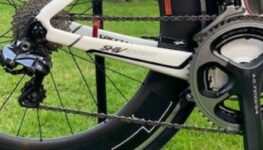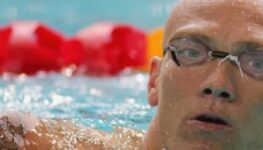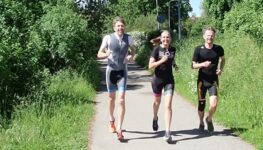Coaching outside the box
Documentary featuring Arthur Lydiard and Peter Snell
This week we send you a documentary from YouTube. Peter Snell was a running World Champion and record holder from the 1960’s. Peter’s success was largely due to luck (he didn’t intend to be a runner) and thanks to the encouragement and planning of his coach, the legendary Arthur Lydiard.
Arthur’s approach to coaching greatly influences our coaching approach, he was an “outside the box” kind of guy, using only what worked rather than employing “theoretical” or “laboratory” proven methods. He received lots of criticism over the years, just like other mavericks (Brett Sutton, Mike Mentzer, Mark Rippetoe, us, etc), but the results proved their criticism was unjustified – which still doesn’t change their views!
Key Points:
- Peter ran anaerobic (“middle distance”) events, but prioritised low intensity training:
- 100miles per week (this is for a specialist runner and not for TRIATHLETES) of low intensity to build his aerobic system – blood vessels and oxygen carrying capacity – so that his body could deliver more blood when running at fasters speeds.
- Early days of polarized training, before it was known as “polarised training”. EASY work is EASY and takes up the majority of training hours, HARD was hard and fast (hill reps or track work). The pace in between not widely used, apart from race day.
- He has made mistakes, a big one was racing too soon after illness (within a few weeks of the race)
- Negative splitting races
- Apart from pure speed/power events (50m swimming, 100m running, weightlifting, etc) a negative split approach is used – control the first ¾ of the event (swim, bike and ¾ run) so you can finish the race strong and fast
- To reach his potential he had to get into the monotonous daily routine of training
- “Effective” training may not be the most enjoyable – adding variety turns training into “exercise”. Exercise is random and not tailored to the end goal.
- “Variety is for the weak minded” – Joel Filliol. You should all know who Joel is from previous podcasts, and even remember this quote from the episode sent on 13th Jan 2020!
- Accept effective training for what it is if you want to reach your performance goals
- Learn to focus on your movements, feelings and visualise how the training is going to help in the long run to find enjoyment and accomplishment
- Race often out of season – mini event goals throughout the whole year helps focus and fitness development.
- We want you all to race, not necessarily to race every race, but to test and learn ways that you can carry forwards to “A” races.
- Know and adapt to race day conditions
- If it’s hot, humid, at altitude, windy, etc you must adapt your mindset and race effort to suit – race day bonking or long term ailments could be the result of not doing so!
- Illnesses and setbacks in the early stages of training blocks are not always as bad as they seem – if you ease back training to allow the body to recover it can actually be advantageous, as your allow the body to consolidate training and reduce the likelihood of overreaching
- Arthur and Peter don’t focus on style (technique) – specifically talking about the arms in this video. The individual’s style is the best style for them!
- Take note of his running movements, they are “strange” and not what is preached, yet Arthur didn’t change it – to do so would likely have compromised his effectiveness
- It’s not all about winning and losing, there’s the enjoyment and satisfaction of a good session. Stating that when he retires, he will continue running for this very reason.
So, you see, training isn’t complicated, but it is made to be. Let your body figure out its best movement patterns, train the right energy systems (aerobic system being your absolute most important), be adaptable to the situations dealt to you (training days and race days), listen to your body and learn to appreciate the little things (in training and races – not the outcomes (times, power, places, etc).



